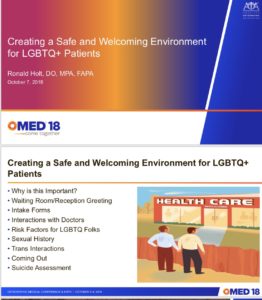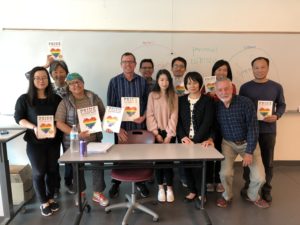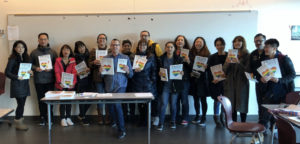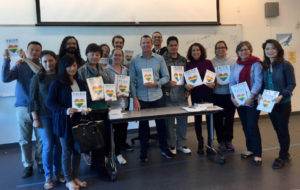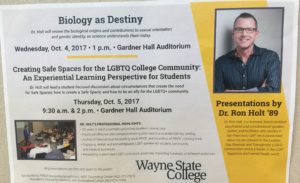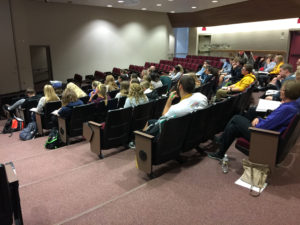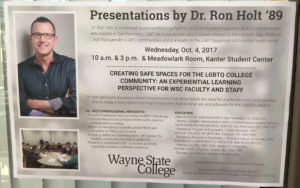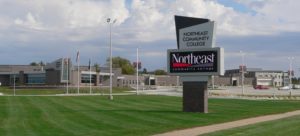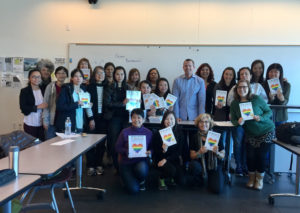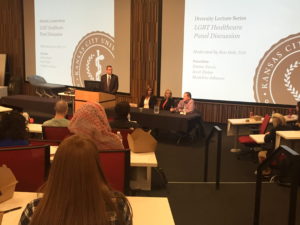
Obstacles in Obtaining Culturally Competent LGBT Healthcare: A Panel’s Perspective
The panel presentation was part of a diversity lecture series sponsored by the Advocates for Diversity in Medicine (ADM) student club. A panel representative of the LGBTQ community discussed their healthcare experiences and obstacles to receiving culturally competent care. Dr. Holt served as the panel’s moderator and assisted with audience questions.
The audience consisted of first and second year medical students, faculty, staff, and bioscience students.
Audience feedback/ impact/ things learned from presentation:
Very helpful!!! As someone who grew up in a traditional Christian household, this helped me understand the community that I have been ignorant about, but want to serve. I have learned a significant amount about how the LGBT community thinks. Not only about medicine, but how they feel about themselves. This had helped me learn how to approach these patients appropriately.- 23 y/o M
Really informative and eye-opening. Overall, a really valuable use of one hour and I wish it was in the regular curriculum. I will be more careful and conscious of how I approach interactions with patients and other professionals.- 23 y/o F
Humbling; informative; an absolute privilege to listen to the panel. Not conforming to heteronormative cultural standards in NOT a moral failure. I will try to be conscious of the terrible neglect the LGBTQ community have faced in a medical office.- 25 y/o M
I am a politically and religiously conservative doctor-to-be, but I want to better understand every patient and person that I may encounter in practice and in life. I plan to try to be sensitive, patient, and open minded in my practice with every patient that walks into my office.- 23 y/o F
I was looking forward to this to see this unique perspective. I was shocked with the statistics. I can’t believe physicians would neglect LGBTQ care for personal beliefs. Very educational. I enjoyed and would like to see more events like this.- 27 y/o M
I learned to add gender identity and sexual orientation questions to check-in form; educate LGBT patients on how to navigate insurance coverage; and age at which children can identify as LGBT. I will be much more cognizant of LGBT concerns and issues and more confident in my ability to work with LGBT patients.- 26 y/o M
A very informative session. Had a little bit of an idea of the discrimination against LGBT community, but had no idea how much there was. I learned very good tips about how physicians can approach these patients.- 23 y/o F
I learned how to ask open-ended questions when treating the LGBT population. I have more awareness and respect now.- F
Great panel. This is the third one I’ve been to. I learned to be aware of terminology/pronouns, make sure to leave judgment behind and be open to learning about different lifestyles.- 28 y/o F
Amazing panel. I will make an effort to be a better advocate/ally of the LGBTQ community – especially in healthcare settings.- 24 y/o M
Very informative and opened my eyes. I learned how to approach treating LGBT patients. Be open minded and non judgmental.- 26 y/o M
Great presentation! Very powerful testimony and I am extremely appreciative of the insight into the LGBTQ community. I learned to be empathetic and inclusive to all patients. Do not assume and treat everyone with respect.- 22 y/o M
So thankful these people were willing to be vulnerable to share their stories. I learned the stats of the gross undercare of the LGBTQ community. I will advocate for the healthcare of everyone within my own office and within my profession.- 29 y/o F
Different people with the same issues may identify with them differently. I learned to never get complacent with care. This taught me to be more observant and attentive to the emotional and mental distress of others. Something as simple as a pronoun can make all the difference in a patients care.- 28 y/o F
Today had a big impact on me because every speaker was very sincere and truly wanted to help us learn and understand how to have a better impact on their health. Thank you for being willing to tell us your stories.- 24 y/o F
Very diverse and knowledgeable panel. Thank you for all of your info. I now understand the disconnect trans people have with their bodies. This isn’t something I have thought a lot about. I will be way more careful with my use of pronouns in a clinical setting or in my personal life.- 30 y/o F
Great panel and info – especially for people like me from small towns with very limited LGBT interaction. I will be much more aware of tone/body language in dealing with LGBT patients.- 25 y/o F
I will really be careful with the pronouns I use and make sure I stay educated every year.- 24 y/o F
I’m now even more encouraged to be an ally for the LGBT community in every day life and in the practice of medicine.- 23 y/o F
Thank you! This panel brought up huge discrepancies that exist in the medical field that I had not previously thought of. I appreciated the panelists’ honesty and knowledge. I will think about tone/language with patients more.- 24 y/o F
I thought this panel was very informative for my future as a doctor. I learned to always be open and never assume. I will definitely work to be more inclusive and understanding.- 25 y/o F
Very appreciative of everyone’s openness and being willing to share experiences. I will try to be aware of my biases and attempt to phrase things in a way that can be more inclusive.- 28 y/o M
Very helpful. All speakers were very knowledgable and gave good insight into a topic that requires very close care. I learned to be very cautious about tone and the words you say. It means a lot to LGBT patients. I’m much more cautious and aware of problems in LGBT community in regards to their health care needs.- 25 y/o M
Very informative. I learned how to ask and obtain proper info from the patient without making them feel uncomfortable. I will spread the word and support with the medical community on treating LGBT community with respect and proper care.- 23 y/o F
Physicians are a part of the problem when we should be a part of the solution. I will make sure I hold not only myself, but my colleagues as well, responsible for the little things to make all patients feel comfortable.- 24 y/o F
I learned gender identity and orientation are innate. Listen to the patient and make their concerns the top priority. Your patients need your help, and it is imperative that you show them that is the most important thing to you.-22 y/o F
I really liked the stats about depression and suicide as it makes you think about things you didn’t. Really liked the info about making the office more friendly with reading material and flyers to make them feel comfortable.- 24 y/o M
I learned to keep an open mind when interacting with LGBT individuals. I’ve always been pretty open minded and this just further solidified my notion.- 21 y/o M
Thank you so much for this educational experience. I need to be aware of my tone and choice of words with all patients.- 24 y/o M
Great learning experience. I learned legal obligations when treating LGBT population.- 28 y/o M
I learned language is very important to think about – especially with LGBT patients. This was an extremely helpful panel that motivates me to learn about LGBT health and how I can be a better ally to others.- 24 y/o F
Very informative. The panel style was engaging. I learned to be inclusive, be kind, be informed and seek out education.- 22 y/o F
Wonderful, diverse panel. I learned there is great disparity in treatment of LGBT patients from one clinical setting to the next. I need to leave judgment behind and use judgment in diagnostics only. NOT in judging someone’s social/cultural identity.-23 y/o F
I learned how doctors can take simple actions to be more accommodating and make sure our patients feel comfortable. This panel has opened my mind in how I can display my open-mindedness.- 23 y/o F
Informative panel. Learned a lot and the importance of leaving judgement behind and being open minded. I learned how to behave and interact with future LGBT patients so as to not be patronizing and to always be supportive.- 22 y/o F
I learned how important it is for physicians to be all-inclusive and unbiased towards members of the LGBTQIA community, and acknowledging when to apologize for being incorrect and/or offensive towards patients who don’t fit into the typical gender binary.- 21 y/o gender fluid
As a sister, cousin, and niece to members of the LGBT community, I am very happy to see the progress that has occurred in recent years; however, I think there is still so much that needs done to make LGBT individuals feel truly safe and accepted in their communities. I worry for my family and others being discriminated against when receiving the healthcare all people deserve. I just hope my fellow colleagues can also be accepting as future doctors.- 24 y/o F
This lecture was really enlightening. I learned the importance of language, wording, etc. I think this lecture just further punctuated being aware of what you say and how you act with patients.- 23 y/o F
This panel was incredibly informative. I learned to be sensitive of others (LGBT) with things as simple as tone or word choice. Also, self education is critical. I understand that I have a lot of work to do, myself and my colleagues, to give LGBT patients the care they deserve.- 24 y/o M
Excellent panel! I will definitely have an open mind and enhance my education in treating patients in the LGBTQ community.- 26 y/o M
Loved it! I will be much better equipped in working with LGBT patients.- 23 y/o F
I learned ways in which to make the work place feel like a safe environment. This will definitely help me to feel more confident and relaxed during my interactions with members of the LGBT community.- 23 y/o M
